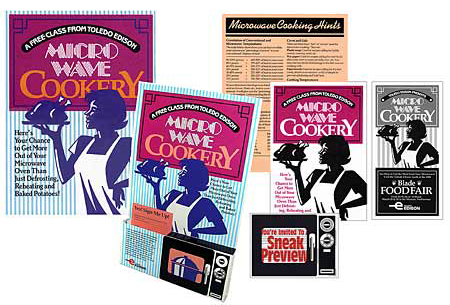


![]()
During the seventies, electricity was a relatively inexpensive commodity, and electric companies aggressively expanded their marketing of electric heat. In the following decade, however, during the first energy crisis, the price of electricity rose rapidly and it was suddenly a very expensive way to heat a home. Energy companies were caught between the
upward price pressure on their fuels and public indignation
over retail energy costs. This brought greater public pressure on regulatory
bodies and greater scrutiny of energy companies.
In particular, any attempt by energy companies to increase energy usage by
the public was strongly discouraged by PUCO in Ohio. However, most energy companies are privately
held enterprises, and need growth to survive.
The
Problem
This was the problem posed to us in 1988 by Toledo Edison: How to stimulate
more electricity business without running afoul of sensitive environmental and regulatory
concerns?
The Solution
Our answer: promote electrically-generated microwave energy. The use of microwave
ovens for cooking succeeds in stealing market share from other fuels and is
actually more energy efficient than natural gas, thus creating both a net reduction in energy usage and a net increase in electricity billings.
 The practical implementation of this strategy was the Toledo Edison Microwave
Cooking School. A demonstration kitchen/classroom was constructed in the Edison
Building and nightly classes in microwave cooking were held. Attendance was
by reservation only (30 students per session) and classes were conducted by
Toledo Edison's in-house home economist. Promotional
countercards with return reservation forms were placed in retail stores selling
microwave appliances, and literature was packaged with all new microwaves
sold. Heavy newspaper advertising in Toledo and suburban papers promoted the
school. Posters and other promotional literature weredeveloped for Toledo
Edison's suburban offices, where many rural residents still went to pay their
electric bills. Emphasis was placed on developing and publishing a large variety
of recipes and meal combinations to appeal to all ages and demographic/ethnic
groups. These and other giveaway items were distributed at the classes. The
school operated at maximum capacity until Toledo Edison's subsequent takeover
and move to Cleveland.
The practical implementation of this strategy was the Toledo Edison Microwave
Cooking School. A demonstration kitchen/classroom was constructed in the Edison
Building and nightly classes in microwave cooking were held. Attendance was
by reservation only (30 students per session) and classes were conducted by
Toledo Edison's in-house home economist. Promotional
countercards with return reservation forms were placed in retail stores selling
microwave appliances, and literature was packaged with all new microwaves
sold. Heavy newspaper advertising in Toledo and suburban papers promoted the
school. Posters and other promotional literature weredeveloped for Toledo
Edison's suburban offices, where many rural residents still went to pay their
electric bills. Emphasis was placed on developing and publishing a large variety
of recipes and meal combinations to appeal to all ages and demographic/ethnic
groups. These and other giveaway items were distributed at the classes. The
school operated at maximum capacity until Toledo Edison's subsequent takeover
and move to Cleveland.